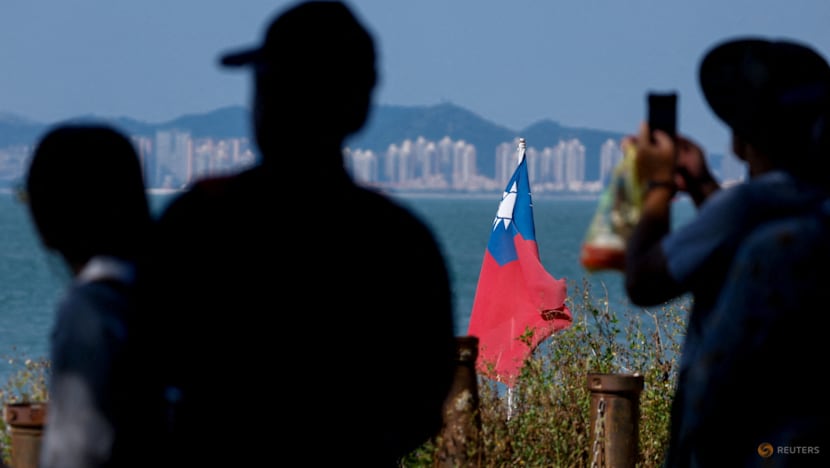China widens mainland access for Taiwanese residents amid icy cross-Strait ties
Effective Thursday (Nov 20), China is allowing Taiwanese residents to obtain single-entry permits on arrival at 100 entry checkpoints, up from 58.

Tourists take photos as a Taiwan flag flies, with China's Xiamen in the background, on Dadan Island, in Kinmen, Taiwan, Oct 18, 2025. (File photo: Reuters/Ann Wang)

This audio is generated by an AI tool.
BEIJING: China has moved to make it easier for Taiwanese residents to visit the mainland by expanding access to on-arrival travel permits, even as cross-Strait tensions continue to simmer.
Effective Thursday (Nov 20), Taiwanese residents can obtain these single-entry permits at 100 entry checkpoints, up from 58.
The expanded list covers land, air, rail and sea checkpoints, including those at the Hong Kong-Zhuhai-Macau bridge, Kashgar and Khorgas in Xinjiang, and Fuyuan in Heilongjiang.
“Taiwanese compatriots can enter conveniently and safely, fully experiencing the warmth of ‘home’,” China's Taiwan Affairs Office spokeswoman Zhu Fenglian said at a press conference on Wednesday.
The entire process on site to secure the on-arrival permit, which allows stays of up to three months, will take only about 30 minutes if Taiwanese residents have the necessary documents, Zhu said.
Zhu also said that China does not place any marks on travel documents for Taiwanese residents and “strictly safeguards their personal information in accordance with relevant laws and regulations”.
First-time visitors from Taiwan will also have their permit application fees waived and can enjoy free entry to more than 3,000 scenic sites.
With winter arriving, Zhu also welcomed Taiwanese residents to participate in ice and snow sports as well as cultural tourism activities in the northeast and northwest regions.
She added that they could also visit friends and family, sightsee and “explore their ancestral roots across various places”.
“Many Taiwanese compatriots have praised these facilitation measures and look forward to travelling around the mainland,” Zhu said.
“We will continue to create better conditions and provide better services for Taiwan compatriots coming to the mainland.”
Taiwan’s Mainland Affairs Council has not responded to Zhu’s latest remarks.
The council previously weighed in on China’s planned move, saying in mid-October that it would be of limited interest to Taiwanese residents and suggested it was more about political posturing, Taiwan news outlet Taipei Times reported.
According to the report, the council also warned that instances of Taiwanese being detained or going missing in China had increased, and urged the public to be mindful of the heightened risks to their personal safety if they planned to travel there.
China views Taiwan as part of its territory and has not ruled out the use of force to bring the self-governed island under its control.
Beijing has stepped up military pressure in recent months, with Taipei reporting incursions by Chinese aircraft and naval vessels on a near-daily basis.
Cross-Strait ties have further soured since Taiwan President William Lai Ching-te took office last year. Chinese officials have branded Lai a “troublemaker” and a dangerous “separatist”.
Yet China has also dangled economic and travel incentives at the same time to Taiwanese residents, as part of a long-held “carrot and stick” approach.
The latest measure may help cross-Strait exchanges, but it is unlikely to shift the broader political climate, said an analyst.
“It'll help at the societal level … family visits, tourism, business travel build familiarity, trust,” said Alejandro Reyes, a senior fellow at the University of Hong Kong’s Centre on Contemporary China and the World.
“But mobility policies cannot overcome political mistrust … these measures will be useful, but limited, and they're not transformative.”

















